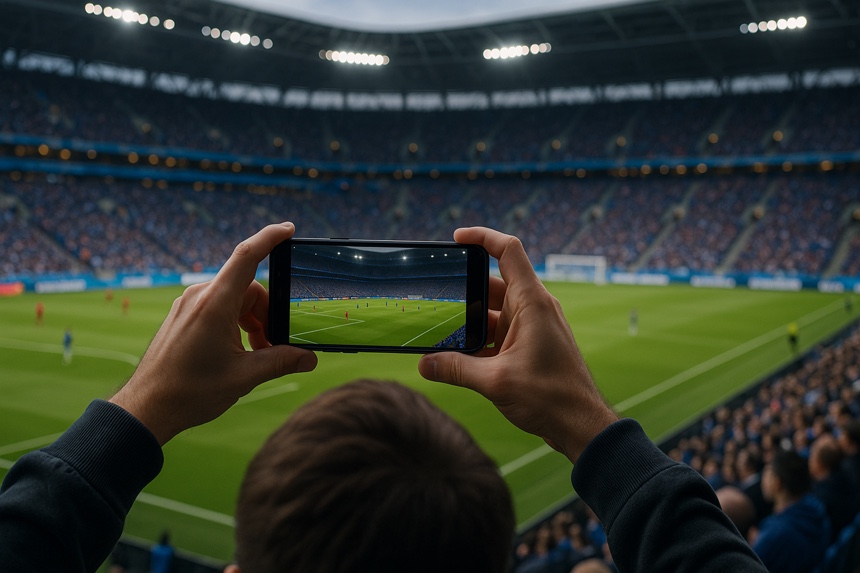Ever wondered why your local college basketball game, regional tennis tournament, or community soccer match isn’t available to stream online? If you’re like most sports fans, you probably assume it’s because broadcasting requires expensive cameras, satellite trucks, and complex technical setups.
Here’s the surprising truth: the technology barrier to sports broadcasting has completely vanished. That smartphone in your pocket? It’s all you need. The real reason your favorite sports event isn’t broadcasted is much simpler – and much easier to solve than you think.
The Broadcasting Revolution Already Happened
Let’s start with a reality check. Today’s smartphones can:
- Stream live video in 4K quality
- Connect directly to platforms like YouTube, Facebook Live, or Twitch
- Handle multiple camera angles with switching apps
- Provide stable footage with built-in stabilization
- Deliver broadcast-quality audio with external microphones
Professional sports broadcasters are already using iPhone setups for major broadcasts. If ESPN can do it, so can your local sports organization. The equipment excuse is dead.
Why Commentary Still Matters (But Not How You Think)
Here’s what makes sports broadcasting actually work: quality audio commentary.
Think about watching any sports event on mute. Even with perfect video quality, the experience feels hollow and confusing. Commentary transforms raw footage into engaging content by:
Providing Context and Storytelling
Good commentators weave narratives, share player backgrounds, explain strategies, and create emotional connections with the audience.
Filling Dead Air
Sports have natural lulls – timeouts, innings changes, injury stoppages. Commentators keep viewers engaged during these breaks.
Educating New Viewers
Not everyone knows every sport’s intricacies. Commentary makes sports accessible to newcomers while keeping seasoned fans engaged.
Creating Atmosphere
The excitement in a commentator’s voice during crucial moments makes viewers feel like they’re in the stadium.
The Game-Changing Truth: Anyone, Anywhere Can Commentate
Here’s where everything changes: commentators don’t need to be at the game, and they don’t need to be “professionals.”
Thanks to modern technology, anyone with an internet connection can watch your stream and provide live commentary from:
- Their living room across town
- Their office during lunch break
- Their dorm room on another continent
- A hospital bed while recovering from injury
- Literally anywhere with WiFi
This means that grandfather in Florida can commentate his grandson’s baseball game in Oregon. That alumni in Japan can call their old high school’s basketball games. That injured player can still contribute to their team by providing expert commentary from home.
Your Best Commentators Are Already in Your Community
Forget everything you think you know about needing “professional” commentators. The best voices for your local sports are probably already around you:
The Passionate Parent
Who knows the team better than the parent who’s been to every practice? They know each player’s strengths, their stories, what they’ve overcome.
The Injured Teammate
Still want to contribute while recovering? Perfect opportunity to provide insider commentary about team strategies and dynamics.
The Die-Hard Fan
That person who never misses a game and knows every stat? They’re a natural commentator waiting to happen.
The Former Player or Coach
Grandparents and community members who played the sport bring historical context and technical knowledge younger fans might miss.
The Enthusiastic Student
Already comfortable talking to their phone for TikTok? They can easily transition to sports commentary.
The Local Business Owner
Want to support the community? Sponsor a broadcast and provide color commentary about the players you’ve watched grow up.
Real Examples Proving It Works
This isn’t theoretical. It’s already happening:
- Youth Baseball Leagues: Parents rotating play-by-play duties from their home offices while watching the stream
- High School Soccer: Injured players calling games via Discord while watching from their couch
- Amateur Basketball: Local restaurant owners commentating during slow afternoon shifts
- Tennis Tournaments: Family members in different countries taking shifts to accommodate time zones
- Community Football: Alumni networks organizing remote commentary from around the world
The Ridiculously Simple Setup
Here’s how easy it actually is:
- At the venue: Someone sets up a phone on a $20 tripod (or just props it against a water bottle)
- Hits “Go Live” on YouTube, Facebook, or Twitch (all free)
- Shares the link with your designated commentator(s)
- The commentator watches the stream and calls in via Discord, Zoom, or even a phone call
- Free apps like OBS or Streamyard combine the commentary with the game video
Total setup time? About 5 minutes. Total cost? Zero (assuming someone has a smartphone).
What’s Really Stopping Us?
If it’s this easy, why isn’t every game already online? The real barriers are surprisingly human:
“We Need Professional Commentators”
The myth that commentary requires special training or a “radio voice” stops organizations from tapping into their community’s enthusiasm.
“It Has to Be Perfect”
Letting perfect be the enemy of good. A passionate parent’s commentary beats no commentary every time.
“Nobody Told Us It Was This Easy”
Many organizations simply don’t realize that broadcasting technology has become this accessible.
“Who Would Watch?”
Underestimating the audience of family members, alumni, and community supporters who can’t attend in person.
“We Don’t Have Anyone”
Not realizing that their community is full of people who would love to contribute but don’t know they can.
The Hidden Benefits of Community Commentary
When you embrace amateur, remote commentary, magic happens:
- More Diverse Voices: Different perspectives from parents, students, and community members
- Flexible Scheduling: Commentators can work around their life commitments
- No Travel Costs: Save money and time when commentators work from home
- Larger Volunteer Pool: People more willing to help when it’s convenient
- Built-in Audience: Commentators bring their own friends and family as viewers
Your Action Plan to Start Broadcasting Tomorrow
For Sports Organizations
- Post in your WhatsApp/Facebook group: “Who wants to try commentating a game from home?”
- Share this article to show how easy it is
- Start with one game as a test
- Celebrate your volunteer commentators publicly
For Potential Commentators
- Volunteer for just one game to start
- Watch from wherever you’re comfortable
- Be yourself – authenticity beats “professionalism”
- Focus on stories and enthusiasm, not perfection
For Teams and Parents
- Organize a simple rotation schedule
- Mix experienced voices with newcomers
- Make it fun and social
- Share the streams widely to build audience
Breaking Down the Last Excuses
“But we need professional quality!” Your audience wants to watch their loved ones play. They’ll forgive amateur production for the chance to see the game.
“What if the commentary is bad?” Define “bad.” An enthusiastic grandparent sharing stories about players is infinitely better than silence.
“It’s too complicated!” If you can FaceTime, you can commentate. The technology is the same.
“Nobody will volunteer!” You haven’t asked yet. People want to contribute but need permission and encouragement.
The Future Is Already Here – Join It
We’re living in an era where:
- Every smartphone is a broadcast studio
- Every fan can be a commentator
- Every game can reach a global audience
- Every moment can be preserved and shared
The technology is free. The commentators are everywhere – they just don’t know it yet. The audience is waiting.
The only question left is: When will you start?
Your Game, Your Voice, Your Revolution
Stop waiting for “someone else” to broadcast your sports. Stop believing you need expensive equipment or professional commentators. Stop letting perfect be the enemy of good.
That enthusiastic parent who knows every player’s name? They’re your commentator. That alumnus living abroad who misses every game? They’re your commentator. That injured player who wants to stay involved? They’re your commentator. That grandparent who played the sport 50 years ago? They’re your commentator.
The broadcasting revolution doesn’t start with ESPN. It starts with you realizing that everything you need is already in your community.
Ready to prove it? Here’s your challenge: Pick one game this week. Find one willing voice (anywhere in the world). Set up one phone. Hit “Go Live.” Then share this article to inspire others. Let’s make “Why isn’t this broadcasted?” a question of the past.

